Renting a car in France is the best way to explore the country and its beautiful regions.
Here is our complete guide to car rental in France, covering :
- what type of car to choose,
- best rental agencies and reviews,
- advice on cost reduction,
- insurance recommendations,
- essential points to avoid any scam,
- rules and regulations,
- driving tips
- …
We’ve tried to list everything you might need to know to have a worry-free car rental experience.
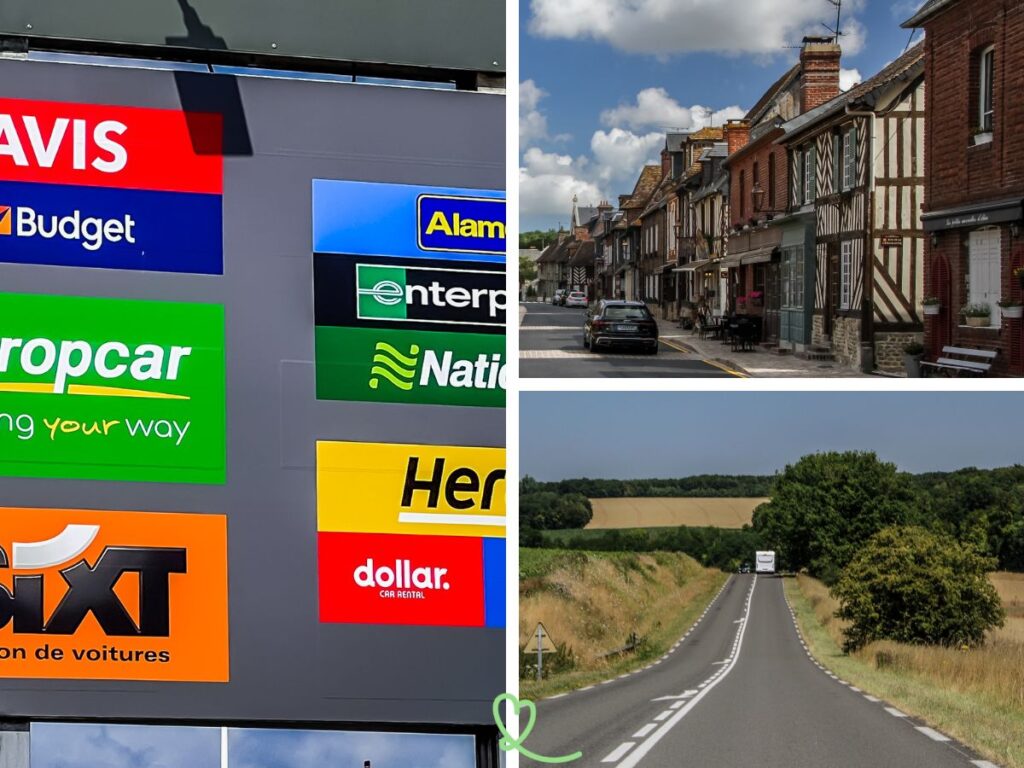
Renting a car in France: the essentials
Do you need a car in France?
It depends on the type of vacation you want.
If you just want to explore Paris, then you can use the intense public transport network.
However, if you want to be able to
- Discover charming villages
- Visit castles
- Going to the vineyards
- Explore regions such as Normandy
Then renting a car is the best option.
Here are some places you could discover with your car in Normandy:

Absolutely essential tips – based on our experiences
If you don’t want to read the whole article with the step by step on how to rent a car in France, here is a short summary of my best tips:
- Size of the car
Do not rent a car that is too large. There are some narrower roads, especially in the old villages and town centers. Moreover, it is easier to park (travelers from the United States, Canada or Australia are often surprised by the places where the French can park!) - Size of the car
If you’re going on a road trip, choose a car with a trunk big enough to hold all your hidden luggage. - Engine
If you are visiting the mountainous regions (Alps and Pyrenees), choose a car powerful enough for the steep roads. - Tolls
Be sure to check how to pay tolls (highways and many bridges require payment). - Book early to get the best prices and choice of cars.
- Always check the car when you arrive and take pictures of everything you see (don’t forget the roof and under the bumper).

The platform we personally use
We always compare prices immediately at Discovercars.com.
It is one of the highest rated comparison sites in the market.
We find great deals and we find the platform super easy to use because we can filter according to our criteria.
Plus, they offer a convenient coverage option at a great price that will cover you in case of damage to the exterior of the car.
See their current car rental offers in France.
See their current offers at Roissy Charles de Gaulle and Orly airports.

Is it difficult to drive in France? Is it safe?
Overall, it is quite easy to drive in France. The roads are in good condition. There is a vast network.
However, be aware of the following difficulties:
- Driving in Paris can be a nightmare, especially the traffic circle around the Arc de Triomphe. We do not recommend driving in Paris. Rent your car before or after your exploration of the capital.
- Some streets in town centers and old villages can be narrow
- Most foreigners will find that parking is the most difficult part of driving in France
- There are many traffic circles. Priority is given to those who are on the traffic circle (except for the special case of the Arc de Triomphe)
- In some cities and towns, most crossings are based on giving priority to the car coming from your right. Be careful, even if your road seems more important, you must give way if there are no signs and markings.
- See all our tips for driving in France

#1 to 3 – How to rent a car in France – required elements
Tip 1 – License to rent a car in France
It is always best to have your international driver’s license when traveling outside the country. That way, you’ll never have to wonder.
However, you should know that in order to be allowed to drive in France (on vacation/short trip), you can use a standard international driving license. This means a permit that has :
- a license number,
- a photograph,
- a validity date,
- and is written in Latin letters
EU citizens can use their EU license.
A valid U.S. license works.
A valid Canadian permit is required.
A valid British license works.
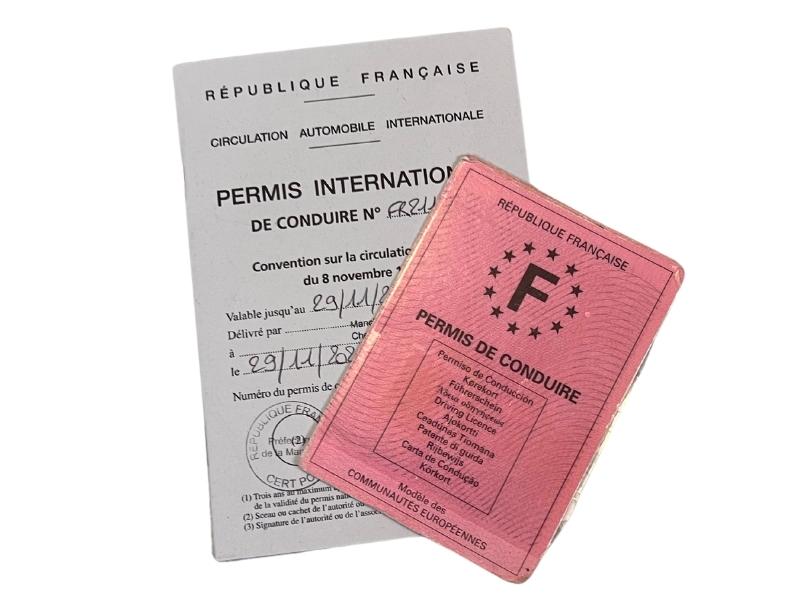
Tip 2 – Additional age requirements / years of driving
The official driving age in France is 18.
However, most car rental agencies in France :
- require you to be 21 years old
- require that you have held a driver’s license in your home country for one year or more
- may add a fee if you are under 25 years of age
- may add fees if you are over a certain age
It is best to make sure you read all the fine print.
On the Discovercars.com platform, you can enter your age, to see any limitations of available rental cars and any additional fees.

Tip 3 – A credit card that can handle the holdback
Keep in mind that unless you have chosen to purchase comprehensive insurance directly from the rental company, you will be asked for your credit card to hold a deposit. This amount is blocked on your account via your credit card (until you return the car without damage).
Because it is in addition to the payment, you may reach your daily/weekly or monthly credit card coverage limit.
So be prepared! Your options are as follows:
- Use another credit card for hold fees,
- Contact your bank before you travel to change your limits,
- Purchase comprehensive insurance with a deductible of 0.
On the Discovercars.com platform:
- Once you have opened an option, you can click on Rental Terms, and you will see the amount of the security deposit.
- And if that’s a problem for you, you can pre-select the amount you’re willing to lock in as a security deposit in the filters:
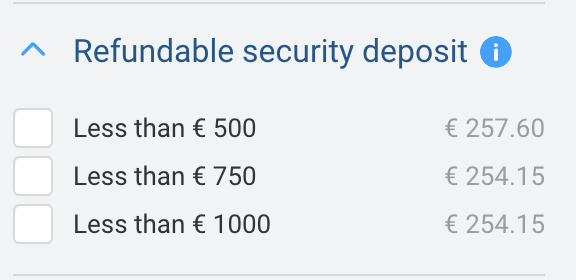
#4 & 5 – Car rental in France: when and where
Tip #4 – Best time of year
France is a very popular destination, especially in summer.
So, if you want to have a choice of vehicle types and good prices, it is best to rent your car as soon as possible.
You will not find any last minute offers in summer. As soon as you have chosen your dates, book the car!
Tip 5 – When and Where
You can rent cars at Paris airports, regional airports, train stations, major cities and ferry ports.
You don’t really need a car to explore Paris. Therefore, we recommend that you finish your rental before you go to the city or start your rental after visiting Paris.
The largest car rental centers in France are :
- Roissy Charles de Gaules Airport – see the car rental offers
- Orly Airport – see car rental offers
- Paris Gare de Lyon – see the car rental offers
- Nice Airport – see the offers
- Lyon St Exupéry Airport – Low cost car rental
- Marseille Airport – see car rental offers
- Toulouse Blagnac Airport – see car rental offers

And to rent in Normandy, consider :
- Caen station
- Bayeux train station
- Rouen station
- Port of Le Havre
- Port of Cherbourg
- Go to the page of the offers in France and type your place of departure
#6 to 10 – What type of rental car to choose?
Tip 6 – Recommendations for car size / power
We know that it depends on how many people are traveling and how much luggage you are taking.
But here are a few things to keep in mind when traveling to France:
- There are narrow roads in the countryside, villages and old town centers. In addition, parking spaces can seem tight for travelers.
- Therefore, we recommend choosing a car that is not too big, in order to reduce the stress of certain situations
- If you are heading to the mountains (Pyrenees or Alps), the roads can be steep.
- Therefore, it is more comfortable to have enough power. We recommend not to choose the smallest motor
- Otherwise, no particular recommendations

Tip 7 – Transmission Type – Manual or Automatic
Most cars for rent in France have a manual transmission.
Rental agencies have automatic cars, but they are often more expensive. And there are fewer of them, so book early.
At Discovercars.com you can use the “Automatic Transmission” filter on the left, if this is a must have for you.
Tip #8 – Fuel Choice – Diesel, Gas or Electric
- The gasoline is called in France “Essence sans plomb”.
- Diesel is called “Diesel” or “Gazole” in France.
- The service station is called in France “Station-service”.
- LGP is GPL
See the concentration of charging stations for electric cars where you go in France on this website.

Tip 9 – Is it useful to have a 4×4 in France?
No. There is really no point in renting a 4×4 in France.
And be aware that even if you have a 4×4, the insurance coverage associated with the rental probably doesn’t cover the use of the car off paved roads.
This is common in many countries. Read the fine print.

Tip 10 – Consider vehicles with sleeping facilities
Another idea is to rent a vehicle in which you can sleep.
Overall, this could save you money compared to booking additional accommodation.
- Wild camping in France is a bit of a grey area
- For local regulations, it depends on the local authorities – check for signs that prohibit it.
- To find special places to park, like farms or vineyards, see France Passion.
- There are campsites everywhere in France
But beware, some villages can be stressful to cross with a motorhome!

#11 to 17 – Best car rental agencies in France – reviews
Tip 11 – Cost of renting a car in France
To give you an idea, based on Discovercars.com data, the prices are approximately :
- There are large variations throughout the year – Average prices vary from 40 to 80 Euros per day
- The cheapest prices are usually for when you travel in March
It’s very easy to compare prices online on platforms – but if you’re comparing between sites, don’t forget to check for any hidden fees.
Tip 12 – How to choose a car rental agency
- First of all, of course, the company must have the type of car you need.
- Then, see the cancellation fees.
- Mileage allowance – depending on what you plan to do, take a look at the unlimited mileage or daily mileage allowance
- The location of the pickup – some require a shuttle to get to the rental location.

Tip 13 – Top rated car rental agencies in France
First of all, don’t forget that on Tripadvisor or Google for example, anyone can write a review even if they haven’t used the company.
On the Discovercars.com platform, each rental agency has a 10 point rating.
It is an average of the ratings given by real customers – On the search page, you can select only the best rated :
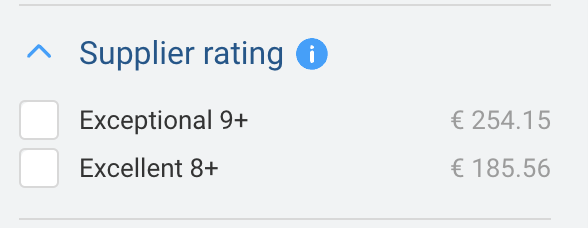
Some of the top rated car rental agencies in Paris are :
- Sixt at Orly airport
- Keddy in Roissy CDG airport
- National at Orly airport
- Enterprise in Paris Gare de Lyon
Tip 14 – How to save money – cheap car rental in France
If cost reduction is your primary concern, you should:
- Book early
- Return the car to where you picked it up
- Reserve a smaller car
- Pay attention to pick-up and drop-off times – Car rentals are generally charged in 24-hour periods.
- Choose a rental with no cancellation or with limited cancellation
- If you are renting for 6 days, check the price for 7 days – sometimes companies have a discount for week-long rentals.
- Book with limited mileage
And always understand that you can’t have everything: the lowest price, the best service in the world and a brand new car… Price, quality and service are always in balance.
Tip #15 – Check the hours of operation if you are taking a company that is not located at an airport
If you pick up your car at the airport, the companies are normally open as long as flights are arriving.
However, if you rent a car in a city, especially a small town, their opening hours will be shorter (especially on weekends).
This may mean that you will have to rent for an extra day if you cannot drop off the car.

Tip 16 – Car rental scams in France
There is no specific scam in France, to our knowledge.
As in most countries, if the price is very very low, then there must be conditions and tricks behind it.
And some companies do try to charge more for damages. My advice is to always take the time to check the car and take dated photos upon pickup and return.
Tip 17 – Be careful if you take a ferry or cross a border with the car
From France, you can :
- Take a ferry to Corsica or England
- Take a ferry to the small islands
- Move to Belgium, Germany, Switzerland, Italy, Luxembourg, Monaco and Spain.
Be sure to read the rules to see if it’s allowed and check if there are any fees.
On the Discovercars.com platform, once you have clicked on an offer, click on “Rental Conditions” and then again on “Rental Conditions” or “Additional Conditions” to find the “Geographical Restrictions”.
If they are not documented, you can add the question for customer support to answer.

#18 to 19 – Understanding Insurance
Tip 18 – Choose the types of insurance you need + requirements in France
There are many levels of insurance. And their wording is often not very clear.
Here is a high-level overview of the different types of insurance – which are not really insurance, but waivers to limit your liability:
- Collision Damage Waiver (CDW) – limits the customer’s liability during the rental period and sets the maximum amount the customer will pay in case of damage.
- Theft Protection (TP) – limits your liability to the deductible/excess amount of the vehicle in the event of theft of the car (proof required is a police report and the car keys). TP is often included in the price of the car rental.
- Third Party Liability ( TPL) – covers personal and property damage to other people’s cars and property and even medical expenses. They have different limits.
- and many others…
The compulsory insurance in France is the civil liability insurance. It is included in the price of the rental car.

Tip #19 – 4 Ways to Buy Insurance
- Option without insurance – apart from the compulsory insurance, you are not obliged to take any extras. Just be aware that in the event of an incident, you may be responsible for your entire deposit.
- Option 1 – Use your credit card insurance/ or your own auto insurance
Many credit cards offer some sort of rental car coverage. They all differ.
Similarly, your personal auto insurance may also cover you when you rent a car.
You must read all the fine print to understand what is and is not covered. - Option 2 – Subscribe when you reserve your rental car
When you book your rental car, you normally have the opportunity to select the insurance you want. The offers are most of the time better than at the counter (I saw 3 times less, once).
On the direct sites, you get the dealer’s insurance, but on the platforms, you get special insurance created by the platform.
For example, on Discovercars.com, they have their own “Full Coverage Waiver” insurance option.
Personally, this is what I used. I know I may already be covered by my credit card and everything else, but this seems like the easiest, most direct route in case of a problem. Personal feeling.
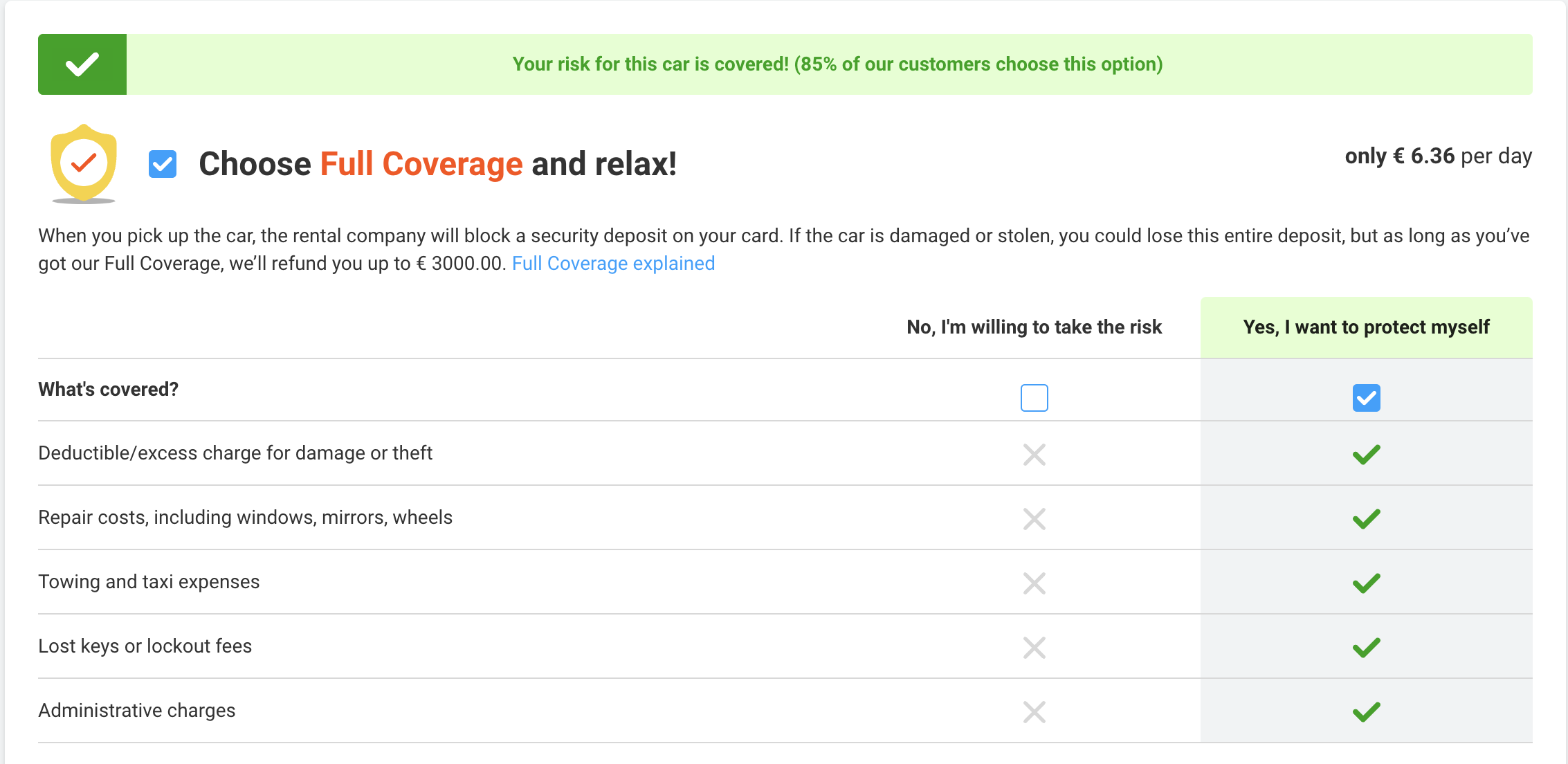
- Option 3 – At the car rental
This is the most expensive option, but if you’ve never done it before, you can purchase it at checkout. - Option 4 – Travel Insurance
Purchase travel insurance that includes comprehensive car rental insurance from one of the traditional insurance companies.
#20 to 22 – Extras
Tip 20 – Need a GPS?
To navigate, a GPS can make your experience smoother. This way, you can concentrate on driving.
- Option 1 – Bring your own GPS
This is our preferred option. We know how it works, and we can enter all the destinations in advance, which saves a lot of time. - Option 2 – Use your phone
If you have a phone, keep in mind that roaming charges abroad can be very high.
However, you can download a map in advance, when you are connected to the wifi, so you can navigate without spending money.
Don’t forget your phone charger and holder to keep it comfortable! - Option 3 – Take the GPS as well
We do not recommend it. I think it’s a last resort if you don’t have your own or a good phone. We always find them very expensive.
Tip #21 – Additional Driver Fee
Decide in advance whether or not you will need more than one driver.
If this is the case, keep this in mind when comparing rental offers between companies.
Some companies offer deals with an extra driver for free.
On the Discovercars.com platform, if available, it can be selected on the filters :
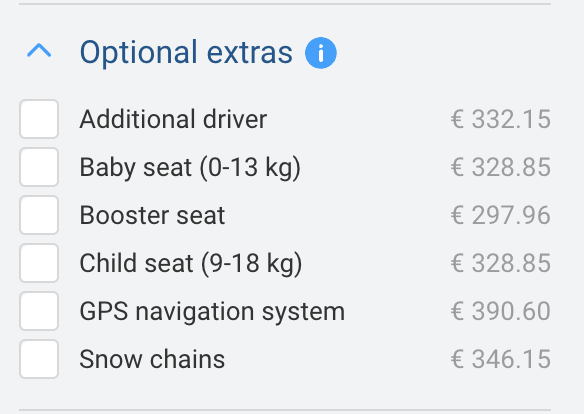
Tip 22 – Child Seat Rules in France
Children under 10 years of age must be seated in a special seat in the back of the car.
#23 to 30 – How to collect and return the car to avoid problems
Tip #23 – Check your vehicle at pickup
For a hassle-free exchange with the car rental company, we recommend that you perform a thorough check of the car before leaving the parking lot.
Sometimes this is done with an agent. Sometimes they simply give you a form with the condition of the car before the rental. Sometimes they don’t tell you anything…
Make sure all dents and scratches are noted, if not, make sure they add them.
In addition, to have peace of mind, you can take pictures before leaving (as in all countries).
Things to look for:
- Check the entire exterior of the car for dents and scratches.
- Don’t forget to check the roof !!!! It is often forgotten, but it may be checked when you return.
- Don’t forget the underside of the bumper
- And don’t forget the back of the mirrors
- Check the interior for damage
- Check the condition of the tires
- Check the condition of the wing (mud wing above the wheels)
- Check that the spare tire is in place and in good condition
- Verify that the fuel level and mileage match the record

Tip #24 – Make sure the mandatory equipment is in the car
In France, the following equipment must be available in the car:
- Warning triangle
- Reflective vest or jacket for at least 1 person
- Spare tire (recommended – but not required)
Tip 25 – Toll Management
There are many tolls in France.
If you want to use the highways and some bridges, you will have to pay.
However, you can avoid the highways and take smaller roads through the countryside. It will take more time but cost less.
For the time being, all toll plazas still have credit card toll booths. You may have to pay for each one. Or you may have to take a ticket at the entrance and pay at the exit.
Look at the icons at the top:
- if only one T – you can only pay with the ticket
- if only a T and cards, you can’t pay with cash

Tip #26 – What to do if you get a fine or ticket (speeding / parking)
You are responsible for any traffic tickets or fines you receive during the rental period.
If you are notified immediately, you may pay at the police station or online as indicated.
But be aware that it can take up to 3 months before a fine is reported to the car owner (the rental company). In this case, they will send you a proof and charge you for it and may add an administrative fee for handling the fine.
Tip 27 – What to do if there is a problem with the car?
Don’t lose your rental agreement.
On this page, you will find the steps to take if you have a problem with your car.
Most use a breakdown assistance service and the number will be indicated on the contract.
You can then contact the rental company to see how to replace the car.
Tip #28 – Don’t forget to manage your tank
More and more agencies now have a system where you have to return the car with the same level of fuel (not full to full but same to same).
It’s very annoying, but it’s more manageable for them.
Therefore, you need to understand how much the car consumes and how many kilometers/miles you have left, if you don’t want to waste money.
Tip #29 – Returning the Car
For peace of mind, try to drop off the car during business hours so that all checks can be completed and validated.
If this is not possible, take pictures of the car before you drop it off.
Don’t be stressed. If you’ve hired a reputable company and follow the rules, everything should go smoothly.
Tip #30 – What to do if you damage the car
If your rental car is damaged, the first thing to do is to contact the car rental agency.
- If your rental only has basic insurance, you will be responsible for covering damages up to your deductible.
- If you have full coverage with the rental agency, check with them and the damage should be covered
- If you purchased with Discovercars.com, contact them and provide all information (within 28 days of the car drop off). They will reimburse you for the fees and costs associated with the damage, if warranted.
- If you use your own insurance, contact them and provide all information. They will reimburse you for the fees and costs associated with the damage, if they are justified.

#31 to 35 – Getting ready to drive in France
Here is an overview of the main things you need to know.
You can read more in our article on driving in France.
Tip #31 – Understand traffic rules and conditions
- Driving is on the right side of the road
- Seat belts are mandatory for all
- The blood alcohol level is 0.05%.
- The speed limits are well indicated in the red circle.
- Most villages have a 30km/h limit and many (too many) speed bumps.
- In France, if a crossroads has no sign or indication, you give way to the person coming from your right.
- Traffic on the traffic circle has priority
- The use of the horn is only allowed in case of immediate danger (although the French tend to forget this rule)
- You are not allowed to turn right at a red light, as is possible in some countries

Tip 32 – The French “Priorité à droite
Pay attention to an unfamiliar rule.
In French cities, when you come to a crossroads, if there are no stop signs or priority signs at all, then the vehicle coming from the street to the right of you has the right of way. And you have the right of way on the streets to the left.
Tip #33 – Know the potential hazards
You won’t see many animals on the roads in France.
The main dangers when driving in France are cyclists and some locals who make crazy overtaking.

Tip #34 – Plan your route
It can be fun to go on an adventure.
But if you want to see several locations during your road trip, it is better to plan ahead to balance your days and book accommodations.
Find all our regional sites:
- Loire Lovers to discover the Loire Valley
- Normandie Lovers to discover Normandy
- Corsica Lovers (coming soon)
Tip 35 – What to do in case of an accident
If people are injured or if there is a conflict, the emergency number in France is 112:
The best order of action is
- contact emergency services
- contact the police
- contact your rental company

